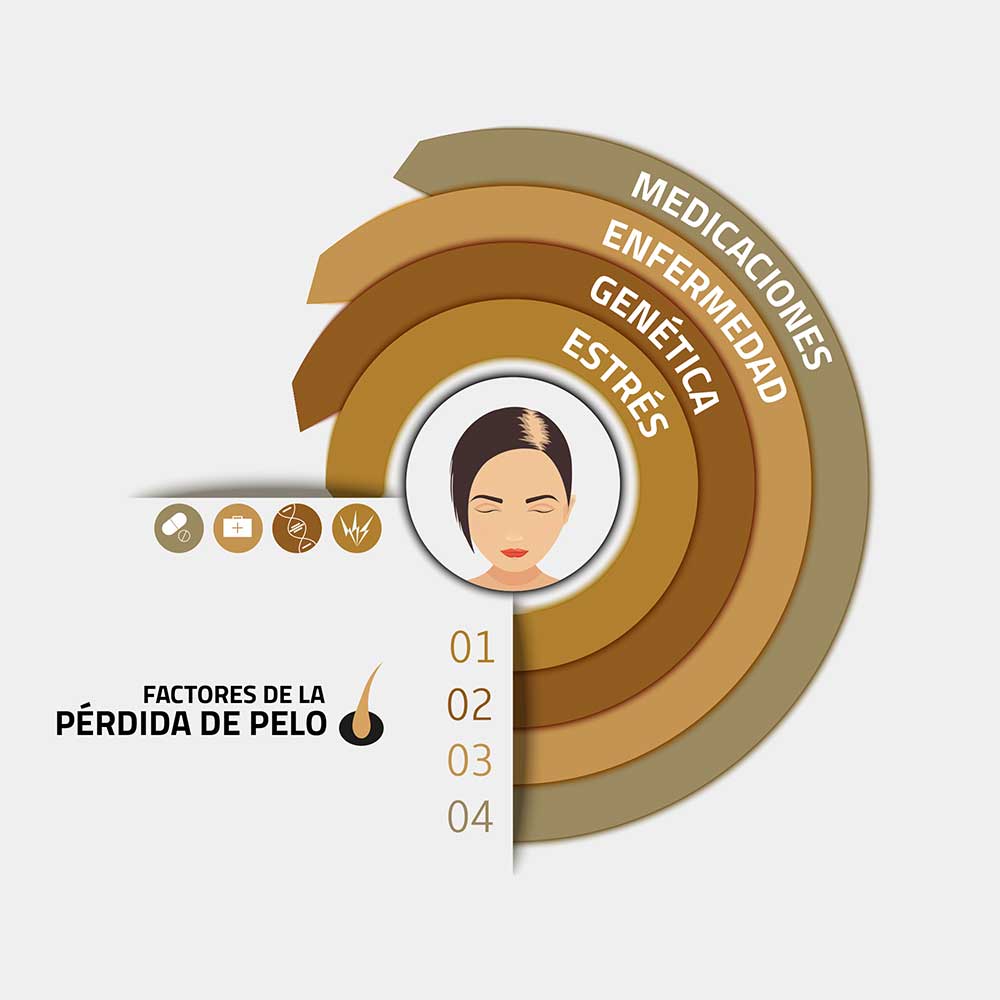
Causas más frecuentes de la caída del pelo
En anteriores posts hemos explicado qué es la alopecia y quienes pueden padecerla. Y, aunque existen diferentes motivos por los que se padece, es importante delimitar algunas de las causas principales por las que se produce la caída del cabello.
FACTOR GENÉTICO
La primera de las causas de la calvicie y una de las principales es la predisposición genética que tengamos hacia la alopecia. Esto significa que la alopecia es hereditaria y, aunque no es posible predecir de dónde vienen los genes que la transmite, bien es cierto que si nuestros familiares más cercanos, sobre todo en el caso de la alopecia masculina, sufren calvicie, será muy probable que nosotros también la suframos. Los síntomas suelen aparecer con la edad a medida que se envejece y suelen comenzar a notarse por la ausencia de pelo en las llamadas entradas y, en el caso de las mujeres, en la pérdida de grosor del cabello.
FACTOR HORMONAL
Como ya describimos en el post alopecia en mujeres, los trastornos hormonales derivados de dos cambios muy importantes en el cuerpo de la mujer como son el embarazo y la menopausia pueden provocar la caída del cabello. En el caso de estos trastornos, el comportamiento de la alopecia puede variar, siendo reversible en el caso del embarazo o duradera en el caso de la menopausia.

ENFERMEDADES
Los problemas de tiroides puede presentar el tipo de alopecia Areata, que dentro de los tipos de calvicie se presenta en parches. Además, otras afecciones médicas como la tiña y la tricotilomanía, la diabetes o el lupus también provocan alopecia.
MEDICAMENTOS
Algunos medicamentos usados para tratar enfermedades como el cáncer, la artritis, la depresión, los problemas cardíacos, la gota y la presión arterial alta pueden tener como efectos secundarios la pérdida de cabello. También es común cuando se realiza un tratamiento de radioterapia de la cabeza. Es posible que el cabello no vuelva a crecer como antes, siendo un evento muy estresante. Muchas personas notan una reducción del grosor del cabello meses después de sufrir un choque físico o emocional, aunque este tipo de pérdida del cabello es temporal.

QUIMIOTERAPIA
Tras los primeros 10 días de comenzar un tratamiento de quimioterapia el cabello se cae prácticamente en un 90%. Esta caída del cabello sucede porque la quimioterapia afecta a todas las células del cuerpo, no solo a las células cancerosas. Sin embargo, no todos los tratamientos de quimio producen caída del cabello, ya que dependerá de los fármacos y de las dosis.
TRATAMIENTOS PARA EL PELO
Algunos tratamientos para el cabello pueden resultar excesivamente agresivos, sobre todo el empleo de algunos tintes o champús que debilitan y fracturan el cabello.
ESTRÉS
El estrés puede causar muchísimos y diferentes síntomas. Entre ellos, la caída excesiva del cabello. Este tipo de pérdida de cabello se denomina efluvio telógeno. El cabello tiende a caerse en mechones pero, el problema desaparecerá cuando remita la causa de ese periodo estresante.




